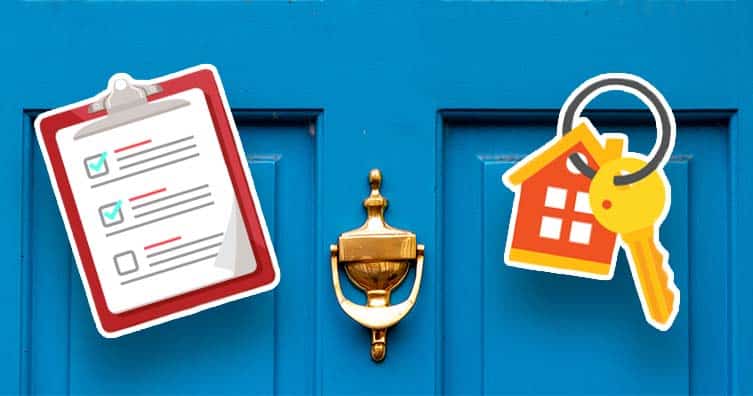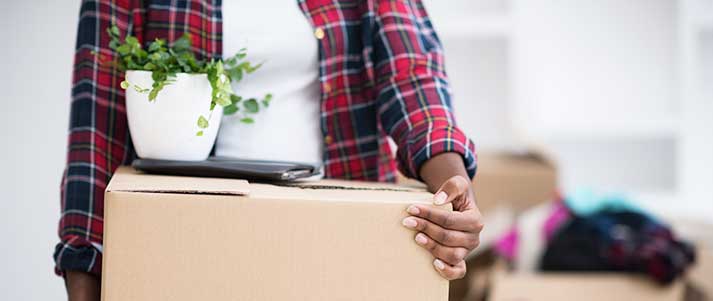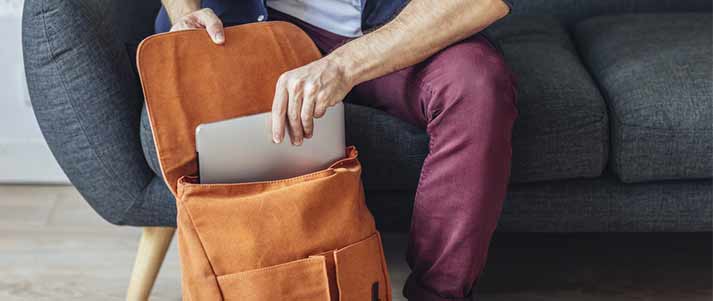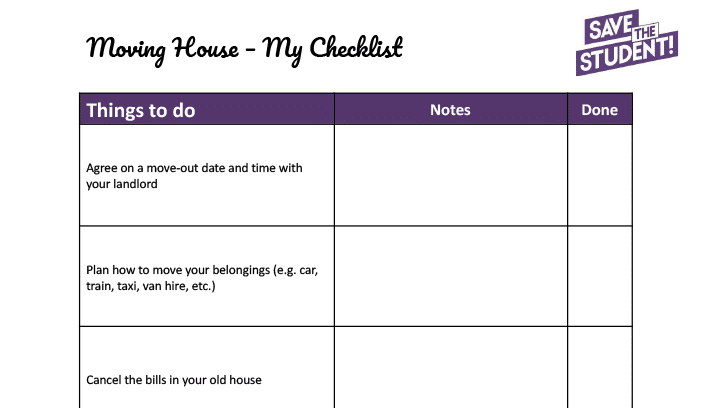Moving house checklist
When moving home, there is so much to think about. How do you transport everything? What should you do to get your deposit back? Our moving house checklist explains all this and more.

Credit: Christina Hemsley, M.Stasy, RedlineVector – Shutterstock
It can already feel pretty daunting to pack everything up and transport it all to your new house. But, unfortunately, these are just two of a number of tasks you need to do when moving home.
Once you've factored in dealing with bills, informing important companies of your new address and doing everything necessary to get your full deposit back, it becomes difficult to keep track of it all.
Although, you'll be glad to know that we've made the whole process much easier for you. We've condensed down the key things to do when moving out, into one simple checklist.
16 best things to do when moving house
Here is the full moving house checklist:
-
Confirm a move-out date and time
As early as you can, confirm with your landlord that you'll be moving out at the end of your tenancy. And while doing so, arrange a date and time for the final checkout.
The check-out time is especially important. This will be when you hand in your keys. You'll need to be confident that everything will be moved out and the flat or house will be spotless by this point.
Try to arrange the check-out time for the end of the day. This will ease the pressure on the move-out day, as you'd have slightly more time to do last-minute tasks.
Aim to have as much of the move done as you can before your check-out day. Moving out always takes longer than you'd expect. You don't want to leave everything until the final day if you can avoid it.
-
Plan how to move your belongings to your new home

Credit: dotshock – Shutterstock
Once you've got your check-out date and time confirmed, the next step is to work out the best way to move your belongings from the old house to your new one.
Here are some of the best ways to move house:
- Car – If you have a car (or know someone who does), this could be a great option for moving house. You could move everything across in one or two trips so it's one of the quickest ways to move.
- Van – Hiring someone with a van (e.g. through a house removal service) is another quick way to move home. It might be more expensive than using your own car but could be cheaper than getting multiple taxis. If hiring a van driver, book through a reputable company with good reviews to make sure they're trustworthy.
- Taxi – Another good option is to hire a big taxi, such as an Uber XL, to transport most of your belongings. It could be a good alternative to hiring someone with a van if you're struggling to find a trusted organisation to book through.
- Public transport – Moving by train or bus isn't easy, but it's possible if you're willing to make multiple trips. It helps if you have a couple of suitcases that hold a lot of things. This will maximise how much you can bring on each trip.
How much does it cost to move house?
The cost of moving depends on several factors. These include the distance between properties, whereabouts in the UK you're based and the number of trips you'll make. And, of course, which mode of transport you take.
We'll use the example of moving one hour away, from one part of London to another, to give general guidelines on the cost of each mode of transport:
- Car – You could be paying £80+ for a full tank of fuel.
- Van – It could cost between £40 – £80+ per hour to hire someone with a van to transport your things. But please note that you might get charged for a minimum of two hours, so the cost would quickly add up.
- Taxi – An hour-long ride in an Uber XL could cost around £40 – £50. Remember that one trip might not be enough, so again, the overall cost of the move would be higher than this.
- Public transport – If you make each journey by bus, it should only cost you around £1.75. Factor in how many trips you will need to take, there and back, to move everything across. Luckily, there's a daily cap of £5.25 on bus fares in London.
To save money on your house move, try to work out which mode of transport would be the most cost-effective for your journey.
-
Cancel bills
Cancelling bills is up there as one of the most tedious parts of moving out. But, it's also one of the most essential.
Get in touch with the companies you've been paying bills to and let them know you're moving.
The main ones will be your gas and electricity suppliers (unless your landlord handled these bills for you).
You'll need to notify the council of your move so that they can update their records. It's important to do this, even if you were exempt from paying council tax.
Plus, if you needed a TV Licence this year, notify TV Licensing that you'll be moving out. You may be able to get a partial TV Licence refund if you paid for the full year but haven't needed the licence for that entire period.
Take final meter readings for energy providers
To make sure you're fully up to date with your bills at the time of moving, take your final meter readings before you move out. This will avoid you getting charged for any energy that's used in the house or flat after you moved out.
Let the energy suppliers know the readings so they can calculate your final bill. It's also a good idea to keep a record of the readings (e.g. as a photo on your phone) in case there are any problems ahead of you receiving and paying the final bill.
-
Pack everything up
This sounds like an obvious step, but don't underestimate this one. Packing always takes longer than you'd expect when you're moving house.
Particularly if you're moving by taxi, bus or train, pack as much as you can into suitcases. This will make it easier to transport everything to and from the stations/taxi pick-up points.
Try to pack up each bag with a particular 'theme' to speed up the unpacking process. For example, you could keep kitchenware together in one suitcase and bedroom decorations in another. Then, label each bag with a sticker to indicate what's inside it.
Unsure how to wrap up fragile items? Pick up some free newspapers (you can usually find them in train stations) and use those. This will help you save money as it means you can avoid buying bubble wrap or something similar.
If you need cardboard boxes, you might be able to get these for free too. Pop into your local supermarket and ask if they have any free boxes they could give you. They might have some lying around that had been used for stock, which would otherwise go to waste.
-
Keep a separate bag for the first night after moving

Credit: By LStockStudio – Shutterstock
When packing, keep one bag aside that's got all of the essentials for your first night in your new home.
It's unlikely you'll have the time or energy to unpack everything instantly. Having easy access to toiletries, pyjamas and a fresh change of clothes for the next day will make a big difference.
-
Check every cupboard and drawer
Leave no cupboard or drawer unchecked when moving house. This will ensure you don't lose anything you'll later need.
You might find cutlery, headphones, stationery or other small items that are easy to miss, but very useful. If you lose them in the move, you'll only need to buy them again in future. So, avoid this expense by doing thorough checks before leaving.
-
Thoroughly clean the house
To get your full tenancy deposit back, it's essential to leave the house to the same standard it was when you moved in.
According to the Tenant Fees Act 2019, landlords can no longer demand tenants hire professional cleaners before they move. If a landlord does request this, contact Citizens Advice. You may find it's an illegal request and not something you should have to be splashing out for.
However, landlords and agents can still request that the property is cleaned to a professional standard.
You need to clean it to the same level of cleanliness it was when you arrived, apart from fair wear and tear. So if it was professionally cleaned before you moved in, you'd either need to clean it to a very high standard yourself or choose to hire professional cleaners.
Tenancy Deposit Scheme (TDS) has guidance on what parts of the property you should pay close attention to when cleaning. They advise that these things need to be cleaned the most before you move:
- Oven
- Shower and/or bath
- Fridge and freezer
- Windows
- Floor.
Try these eco-friendly home and cleaning products. -
Report any damages
In the weeks leading up to your move, look out for any aspects of the house or flat that might need repairing. Inform your landlord of these things before you move, to give them a chance to make necessary repairs before you leave.
As long as the damages are due to general wear and tear, and you've given your landlord reasonable time to fix them, you shouldn't have money deducted from your deposit over them. Make sure you know your tenancy rights.
It could help to inform your landlord of any issues by email. In the message, include images of the damages that clearly show they're the result of wear and tear. Having this in writing is a good idea, in case there are any disputes about the damages after you've moved out.
Small repairs like changing lightbulbs are usually down to the tenant. Make sure you replace any lights that aren't working.
Please note that if you've damaged anything deliberately or out of neglect, money could be taken out of your deposit to fix or replace them. You could offer to repair the damages yourself. This would give you more control over the cost.
And, if your landlord does need to replace anything that's broken, they shouldn't charge more than the cost of that item. If a cheap item of furniture is damaged, they can't charge you for a brand-new, expensive item to replace it.
-
Take photos of the property before you leave
The more photos you take before you move out, the better.
Anything that was photographed in your inventory when you moved in should be photographed again. This will help you see how the condition and cleanliness of the flat or house compares to the start of the tenancy.
And, if your landlord tries to take money from your deposit that you don't think is justified, having plenty of photo evidence will give you a stronger case when disputing.
-
Check the post before leaving

Credit: Marie Maerz – Shutterstock
A final check of the letterbox is important in case, for example, any final bills have been sent to you that you need to pay.
Once you've handed in your keys, you'll no longer be able to receive the post that's sent to your old address, unless it's forwarded to your new home.
You could arrange for your mail to be redirected to your new address by the Post Office. However, this will cost you around £36 to set up.
Having one last look in your post box will take barely any time. And, it's a vital step before the most exciting part of the move...
-
Move into your new house
Finally, after all of the many stages of moving out, you can start moving your belongings into your new home.
As we mentioned earlier, you may need to make a few trips back and forth to transport everything across. But, the end of the moving process is very much in sight at this point.
There are a just few more necessary steps left.
-
Hand in all keys for your old house
Once everything is moved into your new home and you've cleaned every inch of the old property, it's time to hand in your keys. This includes the keys from every tenant, as well as any extra keys like ones for a post box or energy meter.
You need to be sure you won't need to re-enter the house after this. Don't rush this step.
If your landlord has given you specific instructions on how to leave the property, double-check them at this stage.
For instance, they may want you to leave the fridge on at a low temperature. Or, they might have asked for photos of specific parts of the property, like the inside of the oven to prove it's clean.
This is the ideal time to do these things. You can then leave the keys with peace of mind, knowing everything that needs to be done before leaving, is done.
-
Set up new bills

Credit: HAKINMHAN – Shutterstock
Moving house can be exhausting work. But, while it's tempting to sit back and leave the admin tasks until later, your new bills need to be arranged ASAP. This should ideally be done on the day you move in.
Unless your landlord handles your bills for you, contact the energy provider and get the bills set up in your/your housemates' names. Check the meter readings in the new house as you'll likely need these when opening your bills account.
It might take a couple of weeks after ordering broadband for the flat to get WiFi. So, this is another bill that it's good to organise as soon as you can.
And, to protect your belongings from the start of your tenancy, it's good to get contents insurance soon after moving.
We explain the best ways to organise bills, and how to split them fairly between housemates, in our guide to student bills.
You can save loads of money on bills by shopping around to find the best deal. -
Update important companies about your new address
As well as contacting energy providers and the local council, you'll also need to inform some important companies about your move. Here are some examples:
- Your bank
- Student Finance
- DVLA if you have a provisional or full driving licence (you could be fined up to £1,000 if you don't update the address on your licence)
- The local council, both for your old property and your new one (even if you're exempt from paying council tax)
- Your mobile provider.
Essentially, if there are any organisations that you can think of that might need up-to-date records about you, get in touch with them to tell them your new address.
-
Register for a local GP practice
It's important to register for a local GP practice quickly after moving.
It can take around a week for your registration with a GP practice to be processed. So, don't wait until you need an appointment to register.
If, say, you get an infection and need antibiotics, you'll need an urgent appointment. But this would be difficult if you're not registered with the local GP.
Registering early will also mean that your NHS records will be up to date, in case anything gets sent to you in the post, like an invitation to book a screening test or a vaccination.
We have a guide that talks you through how to get cheap healthcare and dentistry. -
Introduce yourself to your new neighbours
Having a good relationship with your neighbours can make such a difference over the course of your tenancy. To get the relationship off to a good start, it can help to knock on their door to introduce yourself.
If you're particularly keen to make a good impression, you could maybe get a small bunch of flowers or a box of chocolates for your next-door neighbours. The gifts don't need to cost more than £5, but they could put a real smile on their faces.
Who knows, it could be the start of a lovely friendship between you and your neighbours.
Download the moving house checklist
To download or print off the moving out checklist, head to our tools and resources page.
Living with flatmates can come with challenges... but for tips on how to live harmoniously as a household, see our guide to surviving shared living.









